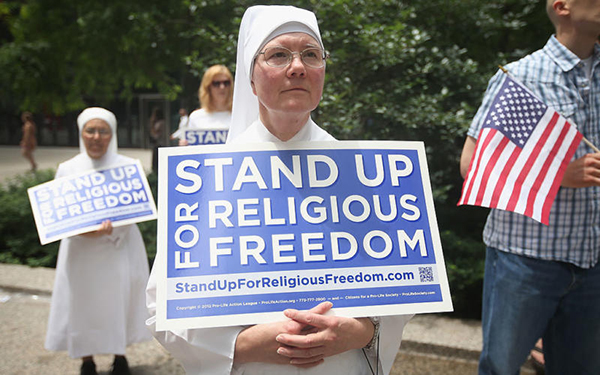Christian supremacism has gotten completely out of hand in the United States.
We’ve seen it in the insurrection warfare of the New Apostolic Reformation, the battle against librarians by the likes of Kirk Cameron, the desire to punish homosexuality by Al Mohler, Dan Patrick’s claims that God wrote the U.S. Constitution, Ron DeSantis’ efforts to redefine American history, and Greg Abbott’s cruelty toward immigrants.
The result: Many ex-evangelicals who have deconstructed their faith are so fed up with Christian supremacy that they can’t imagine being a part of progressive Christianity either, despite any common political views they may hold. They see all Christianity as corrupt.
This negative witness for the faith may be seen clearly in three areas: Worship, abortion, and marriage.
Ironically, the antidote to Christian supremacy in these areas could be one of America’s founding principles: Religious freedom.

Michael W. Smith at the Washington worship rally.
Let us worship or let us burn
When nearly seven million people began dying from the COVID-19 pandemic, then-Vice President Mike Pence and worship leader Michael W. Smith gathered with nearly 100,000 evangelicals at the National Mall in Washington, D.C., for a political worship rally.
Worship leader and political activist Sean Feucht spent 2020 targeting cities that had suffered from police violence against Black people by organizing “riots to revival” events he called “worship protests,” complete with sound systems that would drown out the sound of Black anger and lament.
The backlash to Black Lives Matter was a racism-denial tour.

Sean Feucht
Feucht’s “Let Us Worship” tour robed itself in “Kingdom to the Capitol” T-shirts and engaged evangelical worshipers in the sonic warfare celebration of God taking 300 warriors, overtaking a nation, and never losing a war. Since July 2020, his tour has visited 170 cities. And now, Feucht is in the middle of another tour with the intention to take Let Us Worship “to every single state capitol across America.”
Feucht claims the Constitution grants him the religious freedom to spread misinformation under the guise of a religious revival. But to his surprise, religious freedom applies to other groups as well. According to The Satanic Temple, the band Satanic Planet has responded by applying to play at the same locations where Feucht is playing.
“Feucht is openly a theocrat who courts the attention of politicians and seeks to proselytize through his performances,” Satanic Planet frontperson Lucien Greaves said. “He has his opinions, and we have ours, but one thing the government cannot do is preference his viewpoint over ours by giving him exclusive access to perform a concert on the Capitol grounds.”
Satanic Planet is not seeking to exclude Feucht’s “Let Us Worship” tour from the public square. The goal instead is to claim the same freedom of religion arguments for the “Let Us Burn” tour.
“That stage is every bit as much ours as it is his, so, in the name of pluralism and religious liberty, there are some state capitols that are likely soon to be hosting Satanic Planet shows,” Greaves said.
Feucht responded via tweet: “The devil always tries to counterfeit the authentic.” And he told Religion News Service, “You know you’re doing something good for the kingdom of God when your opponent is literally Satan.”
Of course, most Satanists do not actually believe in a literal Satan. But Feucht doesn’t seem to understand that. Nor do some state officials.
When Riley Phoebus, who leads the Indiana Congregation of the Satanic Temple, attempted to schedule a concert inside the state capitol, his application was denied. Tracy Jones, director of events for the state capitol, told Pheobus “this type of event was not permitted.”
But when the Satanic Temple’s lawyers appealed to the court for their own religious freedom, their concert was allowed. Freedom of religion applies to all forms of religion and to those with no religion at all.

Abortion as a theological policy
Conservative evangelicals have encountered similar surprises in their quest to make abortion illegal in all cases everywhere.
The primary case against abortion is theological, not political. When conservatives declare that “life begins at conception,” that is a theological claim based on Psalm 139:13, not a scientific claim or a public policy claim.
For example, when Hobby Lobby sued to overturn an abortion medication provision of the Affordable Care Act, the rationale was that the religious conscience of Hobby Lobby’s owners was violated by having to comply with the law. Business owners should not be forced to pay for medical services they believe are immoral based on their personal religious beliefs.
But no thought was given to the reality that not all religious people believe life begins at conception. In fact, many other religious people appeal to Genesis 2:7 to promote the idea that life begins when breath enters the body. Thus, many religious people would use Scripture to support the idea of being pro-choice.
Baptist pastor and statistician Ryan Burge has the numbers to support this. When Americans were asked if they would “always allow a woman to obtain an abortion as a matter of choice,” here’s who said yes:
- Reformed Jew — 89%
- Buddhist — 76%
- Hindu — 74%
- United Church of Christ — 72%
- General Association of Regular Baptists — 53%
- Even 29% of Southern Baptists
As Mallory Challis has pointed out, “The right to access abortion is a religious requirement for Jews — a notion supported by many rabbis.” she adds: “Hindus, for instance, believe the right to abortion should be protected because their faith asserts that ethical choices must be made by individuals. Muslims also ‘permit abortions for specified reasons through the 120th day’ of pregnancy to protect the life of the mother.”
After the Supreme Court overturned Roe v. Wade in July 2022, a group of clergy in Indiana challenged that state’s abortion ban. According to Politico, their argument was that “it violates the Religious Freedom Restoration Act signed into law in 2015 by then-Gov. Mike Pence.” A judge agreed with their appeal to religious freedom. So Indiana’s ban was blocked.

Brad Onishi
On a recent episode of the “Straight White American Jesus” podcast, Brad Onishi explained: “Because religion is such an expansively protected category in the United States, oftentimes the best way to fight for rights and recognition in this country is to do so under the banner of religion. That is exactly what is happening here. You have Jewish groups, you have others that are saying, ‘Abortion is part of our religious tradition. It’s part of our religious practice. And so by you not allowing that, you are preventing us from doing things that are actually part of our sincerely held religious belief.”
The religious freedom to marry
In addition to worship and abortion, the third member of religious conservatism’s Axis of Evil is the LGBTQ community. In the case of conservatives who refuse to bake cakes or create websites or take photographs for same-sex weddings, one common theme is that they appeal to their rights of free religious expression.
Photography, cake-baking and website creation are all deemed to be forms of protected speech. No law or government can force evangelical Christians to support same-sex marriage, which they believe to be unbiblical, they reason.
When these evangelicals have failed to force their pietistic views on the entire nation or on a whole state, they have sought carve-outs from laws they don’t want to follow out of conscience. But they seldom are willing for others to receive the same kinds of exceptions they want for themselves.
Once again, claims of religious freedom run both ways.
Thus, when North Carolinians passed Amendment 1 in 2012 to define marriage “between one man and one woman” as “the only domestic legal union that shall be valid for this state,” the law received an unexpected challenger — the United Church of Christ — and was overturned.
“The reason that amendment was overturned was the United Church of Christ stood up and said, ‘For us as a church, to marry people of the same sex or people who are not one man and one woman is part of our religion,’” Onishi explained.
Conservative lack of awareness
In each of these three topics —worship, abortion and marriage — religious conservatives position themselves in places of privilege they believe they alone should access on grounds of religious freedom. Their understanding of religious freedom applies only to them, not to everyone else.
Thus, in each story they are shocked to discover others may appeal to religious freedom as well. And to their disappointment, they are consistently losing when religious freedom is the appeal of the other side.
“Courts have not wanted to be in the business of having to say who real Christians are, who real Muslims are, who real Buddhists are.”
Dan Miller explains on the “Straight White American Jesus” podcast: “American evangelicals actually know very little about other religious traditions or other Christian denominations.” And that “lack of cultural awareness” shows “their cultural privilege” as well as “the lack of historical awareness.”
Religious conservatives’ claim that those who oppose them on religious grounds do not have true religious beliefs also don’t hold water, Miller says. “Courts have been very, very reluctant to weigh in on the sincerity of a religious belief. … Courts have not wanted to be in the business of having to say who real Christians are, who real Muslims are, who real Buddhists are.”
As a result, Onishi predicts, “I think we’re going to see these just continue to pop up. And I think they’re going to be quite successful.”
Lower courts across the nation generally get this right — applying religious freedom equally to people of all faiths and people of no faith — which is why a small group of conservative evangelical law firms keep appealing all the way to the U.S. Supreme Court, where Donald Trump cemented their hoped-for majority of not only political conservatives but religious conservatives.
The question we should worry about now is this: Is the U.S. Supreme Court too stacked with conservative Christian supremacists to care about the religious freedom of those they believe to be lower on their personal religious hierarchy?

Rick Pidcock
Rick Pidcock is a 2004 graduate of Bob Jones University, with a bachelor of arts degree in Bible. He’s a freelance writer based in South Carolina and a former Clemons Fellow with BNG. He recently completed a master of arts degree in worship from Northern Seminary. He is a stay-at-home father of five children and produces music under the artist name Provoke Wonder. Follow his blog at www.rickpidcock.com.
"freedom" - Google News
August 07, 2023 at 05:21PM
https://ift.tt/gbxXfq0
Appealing to religious freedom is the way to counter Christian supremacism in America today - Baptist News Global
"freedom" - Google News
https://ift.tt/ZhVdyUp
https://ift.tt/pQ4UxsC
Bagikan Berita Ini














0 Response to "Appealing to religious freedom is the way to counter Christian supremacism in America today - Baptist News Global"
Post a Comment